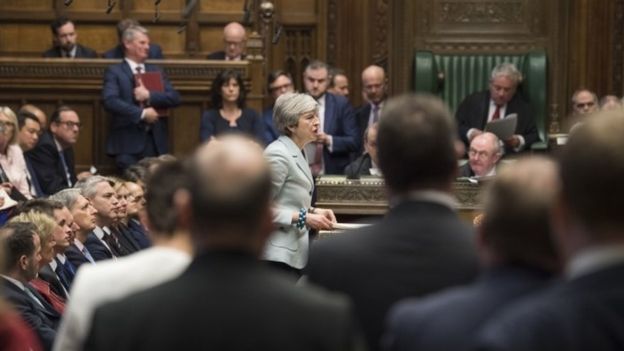MPs are preparing to vote for their preferred Brexit option, with the PM due to meet Tory backbenchers in an effort to win them over to her deal.
Some have suggested Theresa May must name the date she will step down to have any hope of winning MPs’ approval for her deal at the third attempt.
The BBC’s Laura Kuenssberg said some leading Brexiteers were “tiptoeing their way” towards supporting her plan.
Jacob Rees-Mogg has said of the deal: “Half a loaf is better than no bread.”
He told BBC Radio 4’s Today programme he did not “begin to pretend this is a good deal or a good choice”, but he would support the PM’s plan if it had the backing of the Democratic Unionist Party.
The 10 Northern Irish MPs are seen as the key to securing the deal, but they have urged Tory MPs to “stand firm” in their opposition unless there were “significant changes”.
Commons leader Andrea Leadsom said the government was still in talks to persuade the DUP to back it, along with other MPs on their own benches.
Meanwhile, the President of the European Council Donald Tusk told MEPs they “cannot betray the six million people who signed the petition to revoke Article 50, the one million people who marched for a people’s vote, or the increasing majority of people who want to remain in the EU”.
He said the people “may feel that they are not sufficiently represented by the UK Parliament, but they must feel that they are represented by you… because they are Europeans”.
Having voted to seize control of Commons business, backbench MPs will vote on Brexit alternatives later.
The Speaker will select around half a dozen options, with MPs marking on paper each option with a “yes” or “no”.
The process is likely to continue into next week. However, it is unclear whether MPs will be free to vote as they wish or will take orders from party leaders.
Former health minister Steve Brine, who resigned on Monday to back the move to force indicative votes, told BBC Newsnight more than a dozen others might quit government roles if they are denied a free vote.
Ms Leadsom said it was a decision for Mrs May and the chief whip, but added that the votes gave her a “big cause for concern” as the government should be in charge of the Commons.
However, her cabinet colleague, Work and Pensions Secretary Amber Rudd, told reporters: “It’s an important opportunity for the House to show its voice and say what it will accept rather than constantly saying what it won’t accept.”
Labour’s shadow international trade secretary Barry Gardiner told Today he expected there to be a free vote for his party’s MPs later, but that they would be expected to rule out supporting a no-deal Brexit and revoking Article 50 in line with their manifesto.
“We have committed ourselves to trying to deliver the referendum result,” he said. “The Labour party is not a remain party now.”
Meanwhile, the Scottish Parliament is expected to formally back calls for Brexit to be cancelled in a vote later.
What is the PM’s next move?
Mrs May continues to try to win MPs round to her deal, which has been heavily rejected twice. She is expected to address the backbench 1922 Committee ahead of Wednesday’s debate.
Ms Leadsom said there was a “real possibility” the PM’s deal could come back for a vote on Thursday or Friday, adding: “If we could simply get the withdrawal agreement bill under way…once we have done that, once we have left the EU, we can then look at what our future relationship will look like.”
Friday is the day written into law for the UK to leave the EU, but later MPs will vote on a statutory instrument to confirm a delay – with the earliest Brexit is likely to happen now being 12 April.
Writing in the Daily Mail, Mr Rees-Mogg – who is chairman of the pro-Brexit European Research Group of Tory MPs – said “an awkward reality needs to be faced” and he was ready to back the deal so long as it won DUP support.
But ex-Foreign Secretary Boris Johnson told the BBC there was “no point” supporting Mrs May’s deal “without any sign the UK is going to change its approach in phase two” of the negotiations. Otherwise he said he feared the country would be indefinitely tied to the EU’s rules.
BBC political editor Laura Kuenssberg said the not-so-subtle subtext of Mr Johnson’s remarks was “if the PM promises to go soon, then she might get my vote”.
